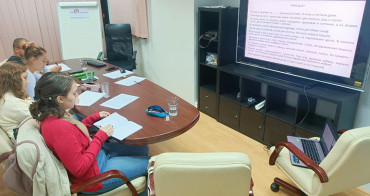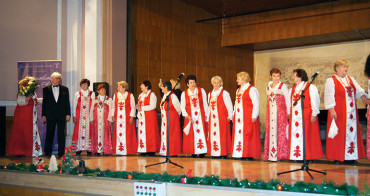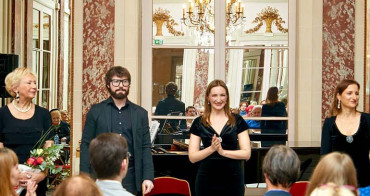 All participants expressed a desire to continue studying the Russian language and visit Russia.
All participants expressed a desire to continue studying the Russian language and visit Russia. Grant Provision Statute
/ Главная / Russkiy Mir Foundation / Grants / Grant Provision StatuteRUSSKIY MIR FOUNDATION GRANT PROVISION STATUTES
1. General Provisions
1.1. These Statutes (hereinafter referred to as the Statutes) stipulates the procedure for providing grants of the Russkiy Mir Foundation (hereinafter referred to as the Foundation) to Russian and foreign NGOs for implementation of projects aimed to promote the Russian language as essential element of the Russian and the world culture, to support Russian language study programs abroad, as well as to strengthen cultural and humanitarian cooperation.
1.2. The Grant of the Foundation is a financial support provided at no cost and on non-repayable basis to individuals and legal entities to implement certain projects under the terms and conditions stipulated by the Foundation, subject to obligatory reporting as to the appropriate use of the funds received (hereinafter – the Report).
1.3. A project in this Statutes shall mean a series of actions intended to achieve certain socially useful results within a certain schedule and estimated cost.
1.4. Grants of the Russkiy Mir Foundation shall be provided on a competitive basis. All other conditions being equal, we choose projects with greater social significance and intended to achieving practical effect.
1.5. Eligible applicants for the grants of the Foundation (hereinafter referred to as the Grant Seeker or Grant Seekers) shall include non-commercial non-profit non-governmental organizations, scientific, educational, cultural, religious and public institutions and organizations duly registered at least one year prior the application deadline for the next competition. A Grant Seeker shall not be under reorganization or liquidation.
1.6. Business entities, as well as corporate non-profit organizations that have business entities among their members, shall not be eligible to participate in the competition.
2. Grant Focus Areas
2.1. The Foundation provides grants in the following areas:
· Projects for the Russian language promotion.
� Projects for cultural and humanitarian issues.
2.2. Projects for the Russian language promotion
Projects for the Russian language promotion shall include those focused on:
� teaching Russian language, including teaching in educational institutions abroad, and teaching Russian as a second language (RSL);
� competence development and further training for teachers of Russian language and literature from schools, universities, and other educational institutions abroad;
� developing new training modules, textbooks, teaching aids, and other materials intended to help those who learn and teach Russian language and literature abroad;
� developing multimedia educational resources and distance teaching system for teaching Russian language and literature;
� methodological and other support for Russian language schools abroad;
� conducting public forums, conferences, round tables, festivals, days of Russian language and other similar activities aimed to promote Russian language and literature;
� organization of academic competitions and contests of Russian language and literature;
� promoting Russian language and literature through mass media, including social and electronic media;
� other events, aimed at the publicizing and promoting the Russian language and literature, as well as supporting related study programs abroad.
2.3. Projects for cultural and humanitarian issues shall include those focused on:
� conducting public forums, conferences, round tables, and seminars dedicated to Russian studies, including Russian history and culture, and Russia's role in the world civilization development;
� release and promotion of Russian-language mass media, including electronic, social media and other informational resources;
� conducting events aiming to preserve historical memory;
� planning and conducting exhibitions, release of photo books, creating video content on the Russian world and its distinguished figures;
� organization of thematic festivals, celebrations, performance contests, competitions of author songs and Russian romances, Russian spiritual culture events;
� arranging other cultural and humanitarian events dedicated to the Russian culture within the context of world culture.
2.4. The Board of the Foundation may resolve to announce special competitive categories within the scope specified in clause 2.1. of these Statutes. The list of such categories shall be published on www.russkiymir.ru , the official Internet portal of the Foundation. (hereinafter - the Foundation’s Internet portal).
3. The Competition Participation Procedure
3.1. To enter the competition, Grant Seekers shall file the application form in Russian.
3.2. The application shall be submitted by filling in an electronic form on the Foundation's Internet portal.
3.3. The Guidelines for the application form, as well as the list of supporting documents and applicable requirements are available on the Foundation's Internet portal.
3.4. Grant Seekers shall have the right to include additional information and project documents in the form of PDF files in the application.
3.5. Projects aimed at financing the activities of organizations and institutions in general, including covering the costs of organizations and institutions for repairing premises, assets formation, fund structuring and financing activities of management and supervisory bodies of organizations, shall be banned from the competition.
4. Terms of application and review procedure
4.1. Applications for participation in the competition are accepted within the following time frames:
� from February 1 to March 15 for the projects to be commenced as from July 1 of the year of the application submission (spring session);
� from August 1 to September 15 for the projects to be commenced as from January 1 of the year following the year of the application submission (autumn session).
4.2. Applications for participation in the competition shall be submitted at or before 11:30 pm MSK on March 15 and September 15 for the spring and autumn sessions, respectively. Any information and documents received by the Foundation after the specified deadlines will not be taken into account and reviewed, save and expect additional information and documents requested by the Foundation from the relevant Grant Seeker.
4.3. Information about the applications for participation in the competition received by the Foundation shall be posted on the Foundation's Internet portal within five business days from the date the application are received.
4.4. The Foundation's Internet portal shall post the information about applications that are recognized as complying with these Statutes, eligible for the competition and to be sent for an independent examination within fifteen calendar days from the specified deadline.
4.5. Applications for participation in the competition, additional information and documents submitted by Grant Seekers shall be reviewed independently for each of the areas specified in clause 2.1. The review shall be performed by the Foundation�s Expert Councils with the compositions approved by the Board of Trustees, and the due consideration is given to the opinion of independent experts.
4.6. Decisions on awarding the grants and on amounts to be allocated for each project shall be taken by May 20 and November 20 during the spring and autumn sessions respectively.
4.7. Determination of the successful projects shall involve the following considerations:
� how efficient the project will be in promoting the Russian language and providing support to its study programs abroad;
� what contributions the project outcomes will make into development of interest in the culture, history and modern life of Russia;
� how relevant the project is;
� social significance of the project, coverage of target groups, the possibility of using the project outcomes by other organizations;
� feasibility and validity of the project goals and objectives, clear presentation of the project implementation plan;
� novelty and originality of the ideas taken as the basis for the project;
� the ratio of the project estimated costs and its expected outcomes, the feasibility and validity of the project estimated costs;
� the project geography, its international status;
� the Grant Seeker�s contribution into the project funding, the amount, contribution by the Grant Seeker�s partners;
� support of the project by international and national professional organizations, associations, scientific and educational institutions, public and non-profit organizations, state authorities and agencies;
� if the Grant Seeker has experience in implementing such projects; whether the project team�s experience and expertise corresponds the planned activities;
� prospects for the project development;
� the Grant Seeker�s transparency, its media and social networking profile.
4.8. Information about the competition results shall be posted on the Foundation's Internet portal.
5. Procedure for Conclusion of Grant Award Agreements
5.1. The projects recognized as successful ones shall be provided funding on the basis of grant award agreements (hereinafter - the Grant Award Agreement).
5.2. If a Grant Seeker�s project is recognized as the successful one, such Grant Seeker shall be sent the notifications specifying the list of documents required to conclude the Grant Award Agreement and the deadline for submitting these documents to the Foundation.
5.3. If the Grant Seeker fails to submit the documents required to conclude the Grant Award Agreement within 45 calendar days from the date of the notification, the agreement with this Grant Seeker shall not be concluded, and the project shall be considered rejected.
5.4. The Grant Award Agreement concluded between the Foundation and the successful participant of the competition (hereinafter referred to as the Grantee) shall specify:
- the name of the project, the goal of the project and the activities within its scope;
- the term and stages of project implementation;
- the grant amount, conditions and procedure for its allocation;
- cost estimate for the project implementation with the breakdown by expenditure types;
- the procedure for monitoring the use of the grant funds, including the Grantee�s Report on the intended use of the grant funds, its structure, filing procedure and deadlines.
5.5. The grant funds shall be transferred to the accounts of the successful participants of the competition in accordance with the Grant Award Agreement and in the currency of the Agreement.
6. Reporting Procedure for Using Grant Funds
6.1. The Grantee shall provide the Foundation with the Report within the time provided by the current Grant Award Agreement.
6.2. The Report shall contain information about the outcomes of the project implementation (project stages), as well as a financial account on the intended use of the grant funds.
6.3. The Report shall include copies of payment records and other source documents supporting the actual costs, as well as a registry of the additional documents.
6.4. Copies of source accounting documents shall be attested by the Grantee and accompanied by explanations in Russian.
6.5. The Grantee shall return funds not used during the project�s implementation (if any) back to the Foundation.
6.6. The Foundation shall approve the Report when all documents and materials provided by the Grantee comply with the terms and conditions of the Grant Award Agreement and support implementation of the project, specify the outcomes of the project implementation and data on the intended use of the grant funds.
6.7. Upon receiving the Approval of the Report from the Foundation, the Grantee shall be deemed free of all liabilities under the Grant Award Agreement.
6.8. The Foundation issues a written statement to the Grantee when the Report is approved.
7. Final Provisions
7.1. By submitting an application for participation in the competition, the Grant Seeker authorizes the Foundation to use all the information provided in the application for analytical and scientific purposes, as well as to process the personal data of persons mentioned in the application.
7.2. A Grant Seeker shall bear the risk of the consequences of failure to receive legal communication sent by the Foundation to the email address specified in the application.
7.3. The Foundation does not provide explanations disclosing reasons for the application being rejected, including the information on the assessments and opinions of experts.
7.4. The Foundation does not reimburse the costs incurred by Grant Seekers in connection with participation in the competition.
7.5. The Foundation arranges and conducts monitoring of the projects for which the grant funds were allocated and evaluates the socially useful outcomes of such projects.
7.6. These Statutes comes into effect from the date of its publication on the Foundation�s website.grant Projects
 All participants expressed a desire to continue studying the Russian language and visit Russia.
All participants expressed a desire to continue studying the Russian language and visit Russia.  Concerts dedicated to Russian culture were held in various cities of Bulgaria, including Plovdiv, Haskovo, Tryavna, Sofia, Dobrich, Dimitrovgrad, Blagoevgrad, Shumen, Targovishte, and Kableshkovo, as part of the "Art Saves the World" project from November 4 to December 4. The initiative was organized by the art center Slavic Culture with support from the Russkiy Mir Foundation.
Concerts dedicated to Russian culture were held in various cities of Bulgaria, including Plovdiv, Haskovo, Tryavna, Sofia, Dobrich, Dimitrovgrad, Blagoevgrad, Shumen, Targovishte, and Kableshkovo, as part of the "Art Saves the World" project from November 4 to December 4. The initiative was organized by the art center Slavic Culture with support from the Russkiy Mir Foundation.  Various events in France featured the presentation of The Path to Love bilingual two-volume edition in October-November. Published with the backing of the Russkiy Mir Foundation. The edition commemorates the 205th anniversary of Ivan Turgenev's birth.
Various events in France featured the presentation of The Path to Love bilingual two-volume edition in October-November. Published with the backing of the Russkiy Mir Foundation. The edition commemorates the 205th anniversary of Ivan Turgenev's birth.